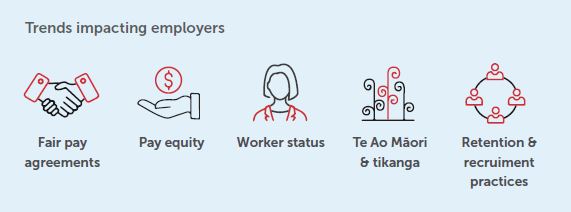The new Fair Pay Agreement regime has fundamentally changed New Zealand’s bargaining landscape across several sectors and pay equity bargaining claims continue to gain traction. We anticipate an increase in bargaining process litigation arising as a direct result of these new legislative regimes.
Meanwhile, employers also continue to navigate the ever-evolving workplace, accelerated by the likes of COVID-19 and rapid technological development. Ongoing uncertainties around worker status issues, the place of Te Ao Māori and tikanga Māori in the workplace, and recruitment and retention strategies will be some of the key issues facing many businesses over the course of 2023.

Fair Pay Agreements
On 1 December 2022, the Fair Pay Agreements Act 2022 (FPA Act) came into force. The FPA Act establishes a framework for bargaining between employers and employees for Fair Pay Agreements (FPAs).
The FPAs will set minimum employment standards applicable across entire occupations and industries for a period of three to five years, regardless of whether an employer or employee participates in bargaining. Mandatory terms include the standard hours to be worked, wages payable (including overtime and penalty rates if applicable), arrangements for training and development, and leave entitlements.
Unions can initiate bargaining for an FPA if they meet the representation test (at least 1,000 employees or 10% of all employees in the proposed coverage support initiating bargaining) or the public interest test (the relevant employees receive low pay and have little bargaining power or a lack of pay progression, or are not adequately paid, taking into account matters such as long or unsocial hours or contractual uncertainty).
Once bargaining has been initiated, the employee bargaining side (generally, the initiating union and other eligible unions) and the employer bargaining side (generally, eligible employer associations or certain specified organisations in the public sector) must engage in good faith to bargain for an FPA. Proposed FPAs must be ratified via a simple majority of employee and employer votes.
The FPA Act will have significant and wide-ranging impacts. In the coming year, we anticipate increased union activity as FPA bargaining is expected to be initiated on behalf of supermarket workers, bus drivers, retail/hospitality workers, cleaners and security guards (as well as on behalf of non-union members who fall within the proposed coverage of the FPA).
Employers operating within these sectors or occupations should be thinking about which eligible entities are likely to satisfy, and seek to be, the employer representative association(s) under the FPA Act. This is because affected employers can only be represented at the bargaining table by employer associations authorised by MBIE.
The Employment Relations Authority (Authority) has a key role to play in the operation of the FPA Act, and we expect more bargaining process litigation to arise as a result. The Authority has wide-ranging jurisdiction to make determinations on matters arising during the bargaining process, as well as making determinations about parties’ compliance with their good faith obligations and with the FPA Act. The Authority will be tasked with ensuring the compliance of every proposed FPA with the FPA Act and other employment law, and assessing coverage overlaps.
Most significant in our view though will be the Authority’s role in fixing the terms of FPAs. This may occur in a broad range of circumstances, including where ratification has failed twice, where no employer bargaining side has formed (and, in that event, without any bargaining having taken place), and where the bargaining sides have, for a reasonable period, used their best endeavours to use reasonable alternatives to agree the terms of the proposed FPA. A panel of three Authority members will be required to fix the terms of an FPA. It is possible that this workload will create delays for other matters before the Authority. However, the full impact is difficult to predict at this stage and is likely to be impacted by how many separate FPAs are initiated in the first year.
Pay equity
Since coming into force in November 2020, the amendments to the Equal Pay Act 1972 have led to a steady rise in pay equity claims. These amendments created a framework for employees and unions to raise pay equity claims and bargain for pay equity settlements. We understand that there are nearly thirty pay equity claims in progress across the country, and that the first fully private sector claim was raised late last year.
Litigation has so far been limited, and in all cases has involved the District Health Boards or Health New Zealand. However, with an increasing number of pay equity claims on foot, as bargaining progresses and the mediation and facilitation avenues provided by the legislation are exhausted, we expect an increase in litigation in 2023 seeking determinations to fix remuneration that ensures pay equity.
Worker status
We were hopeful that 2022 would bring some legislative clarity around worker status issues. Unfortunately, this did not come into fruition. The Government considered whether a new category of ‘dependant contractor’ should be introduced to provide better protections for vulnerable contractors, but this was ultimately rejected following the report of the tripartite working group. Instead, the Government shifted its focus to better resourcing the current system. The recent Uber1 decision in the Employment Court failed to produce any clear guidance on the status of each of the workers in question. However, it did re-enforce the fact-specific nature of a worker’s status.
Looking ahead to 2023, businesses will need to continue to manage worker status risks given the ongoing uncertainty in the space. A key part of this will be monitoring and reviewing existing and new independent contractor arrangements. That said, the Uber decision is being appealed and we will hopefully have some appellate guidance to look forward to in 2023.
Te Ao Māori and tikanga Māori in the workplace
We are seeing an increasing number of employees argue Te Ao Māori and tikanga Māori is not being appropriately applied in employment dispute resolution processes. This is requiring employers to reflect on their degree of cultural competency and consider the place of Te Ao Māori and tikanga Māori in the workplace. In our view, Te Ao Māori and tikanga Māori will have an increasingly important role to play in dispute resolution processes. These concepts support and enhance the statutory duty of good faith and the importance of proper consultation which underpin New Zealand employment law.
Retention and recruitment practices
The ‘great resignation’ of 2022 will likely spill into 2023. Employers are using new strategies to attract and retain staff in what continues to be an ‘employee’s market.’ While this is industry specific, we are seeing an increased use of retention schemes and incentives, remote working (including use of workers based overseas) and leave without pay arrangements to retain staff. On the recruitment front, different strategies are deployed to attract employees depending on their role, age, and the industry. For example, some employers emphasise flexible working arrangements to entice new recruits, while others choose to promote a ‘return to the workplace’ for those so inclined. Either way, continued labour market shortages will require businesses to increasingly rely on our new (and somewhat challenging) immigration settings to enable the right skilled labour to enter the New Zealand market in 2023.






